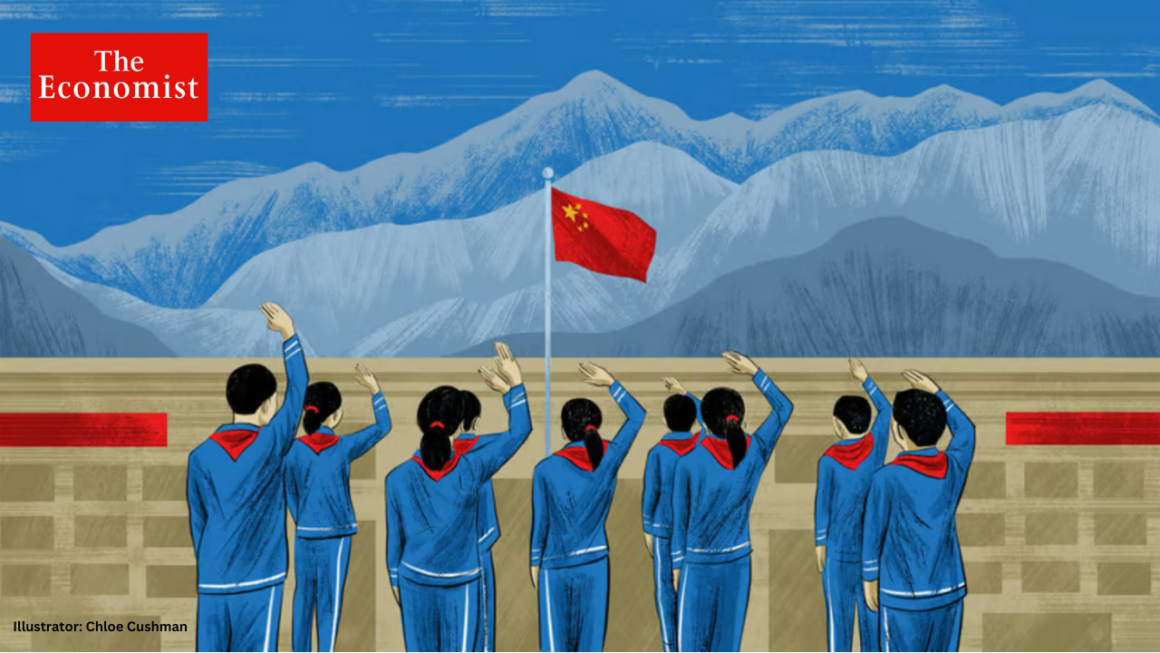The Economist: Why China takes young Tibetans from their families
.
Visiting a Tibetan region where children must attend Chinese-language boarding schools
Illustration: Chloe Cushman
June 13, 2024
Original Article from the Economist: https://www.economist.com/china/2024/06/13/why-china-takes-young-tibetans-from-their-families
An air of quiet piety hangs over Rongwo Monastery in the western province
of Qinghai. The streets near this ancient complex draw pilgrims and Tibetan
Buddhist monks in dark red robes. Local believers make circuits around the
monastery’s yellow walls, turning a line of wooden prayer-wheels as they walk.
On a recent Monday afternoon, though, chattering schoolchildren thronged this
sacred neighbourhood in the heart of Tongren, a small mountain city known to
Tibetans as Rebkong. Youngsters in red scarves and uniform tracksuits bought
fruit and snacks from market stalls, most without a parent in sight. Teenage high-
schoolers and pupils half their age hauled small suitcases or sat in weary groups
beside piles of schoolbags, bringing the bustle of a railway station to streets
around the monastery.
Government policy explains the hundreds of unaccompanied minors filling
Tongren’s historic centre. This particular Monday was a public holiday for pupils
across China, as the country marked the Dragon Boat Festival with a long
weekend. But these youngsters were overwhelmingly ethnic Tibetans. As a result,
on an overcast holiday afternoon they had already bid their families goodbye and
were now heading back to one of Tongren’s dozen or so boarding schools, in time
for classes the next morning.
An ever-larger majority of Tibetan youths attend state-run boarding schools at the
primary and secondary level, and in extreme cases pre-schools. That is true
whether they live in the harshly policed Tibet Autonomous Region, or in the parts
of historical Tibet that the Communist Party carved off and handed to the
neighbouring provinces of Gansu, Qinghai, Sichuan and Yunnan (these are run as
“Tibetan autonomous prefectures”). At least 78% of Tibetan pupils board,
according to official data collected by the Tibet Action Institute, an overseas campaign group.
Lessons in these schools marginalise Tibetan culture. Over the past few years
Mandarin Chinese has replaced Tibetan as the medium of instruction, with
Tibetan taught only as a language, alongside English. All pre-schools, including
in ethnic areas, have used Mandarin since 2021, to “seize the key period of
language learning in early childhood”, as the education ministry puts it.
Authorities call boarding schools “very convenient” for Tibetan farmers’ and
herders’ children who would otherwise face “long and arduous journeys to
school”. Officials insist that parents freely choose whether children board. In
Qinghai, a rugged place with Han Chinese, Tibetan, Hui Muslim and Mongolian
populations, the provincial government declared in 2018 that “in principle”
children should board only when necessary, that they should not board until the
fourth grade (ie, age 11), and that in remote pastoral areas school policies should
follow “the wishes of the masses”.
Tibetan exiles and activists challenge this narrative. They cite state-media reports
boasting of motherly care given to four- and five-year-olds in Tibetan boarding
schools. They describe parents being threatened with fines or with a denial of
schooling later on if they do not send children to board. Many Tibetan families
see Mandarin as a path to employment. But as recently as the early 2000s Qinghai
officials pursued that goal in more humane ways. To reduce drop-out rates and
raise exam scores they expanded bilingual education, hired Tibetan teachers and
accredited schools run by monks. Not now. Private Tibetan schools have been
closed and teachers sacked for teaching Tibetan beyond the curriculum. This has
sparked parent protests, including near Tongren in 2020.
Chaguan travelled to Tongren to weigh claims that coercive assimilation is now
the norm. While in Qinghai he was followed by up to five unmarked cars. Tibetan-
speaking officers (one of whom flashed a police badge) filmed and eavesdropped
on conversations. In Huangnaihai, a hilltop village near Tongren, an officer’s curt
intervention silenced a school headmaster who had been asked how Tibetan
parents view Chinese-language schooling.
Despite the officers’ efforts, holes appeared in the official narrative. Start with
those pupils in Tongren. Though some stepped off long-distance buses, others
turned out to be locals, undermining claims that Tibetan boarding-school
construction is solely explained by the need to spare herders’ children from long
journeys. Then consider two boarding schools in a river valley below Rongwo
Monastery that serve Hui Muslim and Tibetan pupils, respectively. Hui pupils
who live in Tongren do not have to board, but rules are different for Tibetan
pupils, your columnist was told.
Building schools to forge souls
In a Tongren suburb stands the Nianduhu Township Boarding Primary School. Its
gates are flanked by murals showing pupils saluting the national flag, the Great
Wall of China and the slogans: “I will become a great Chinese person” and “The
motherland in my heart”. The Tibetan-majority school is building dormitories.
From the autumn 400 students will live in them, a local education official said.
Asked about first- and second-graders, aged eight and nine, he replied that
county authorities still need to decide whether those youngest pupils will board,
but “the other students will all be boarding.” That includes children with families
nearby.
Such policies reflect an assimilationist logic. In 2015 the State Council (China’s
cabinet) called for faster boarding-school construction to fulfil “the goal that
students of all ethnic minorities will study in a school, live in a school and grow
up in a school”. That serves a larger ambition: to “forge a strong sense of the
community of the Chinese nation”. That is party-speak for promoting a single
national identity to defend social stability and national security. Though clunky,
the phrase is enshrined in the party constitution as a guide to ethnic work in the
Xi Jinping era. If Tongren residents forget the slogan they need only look up. It is
spelled out in big red characters on the hill opposite Rongwo Monastery.




Leave a Reply